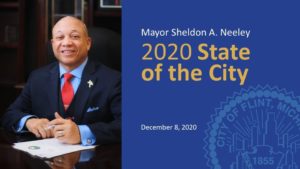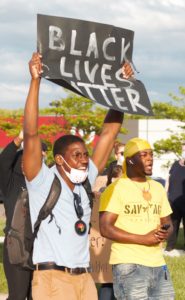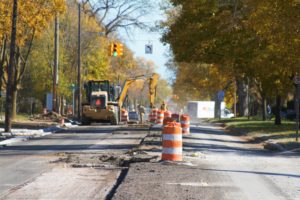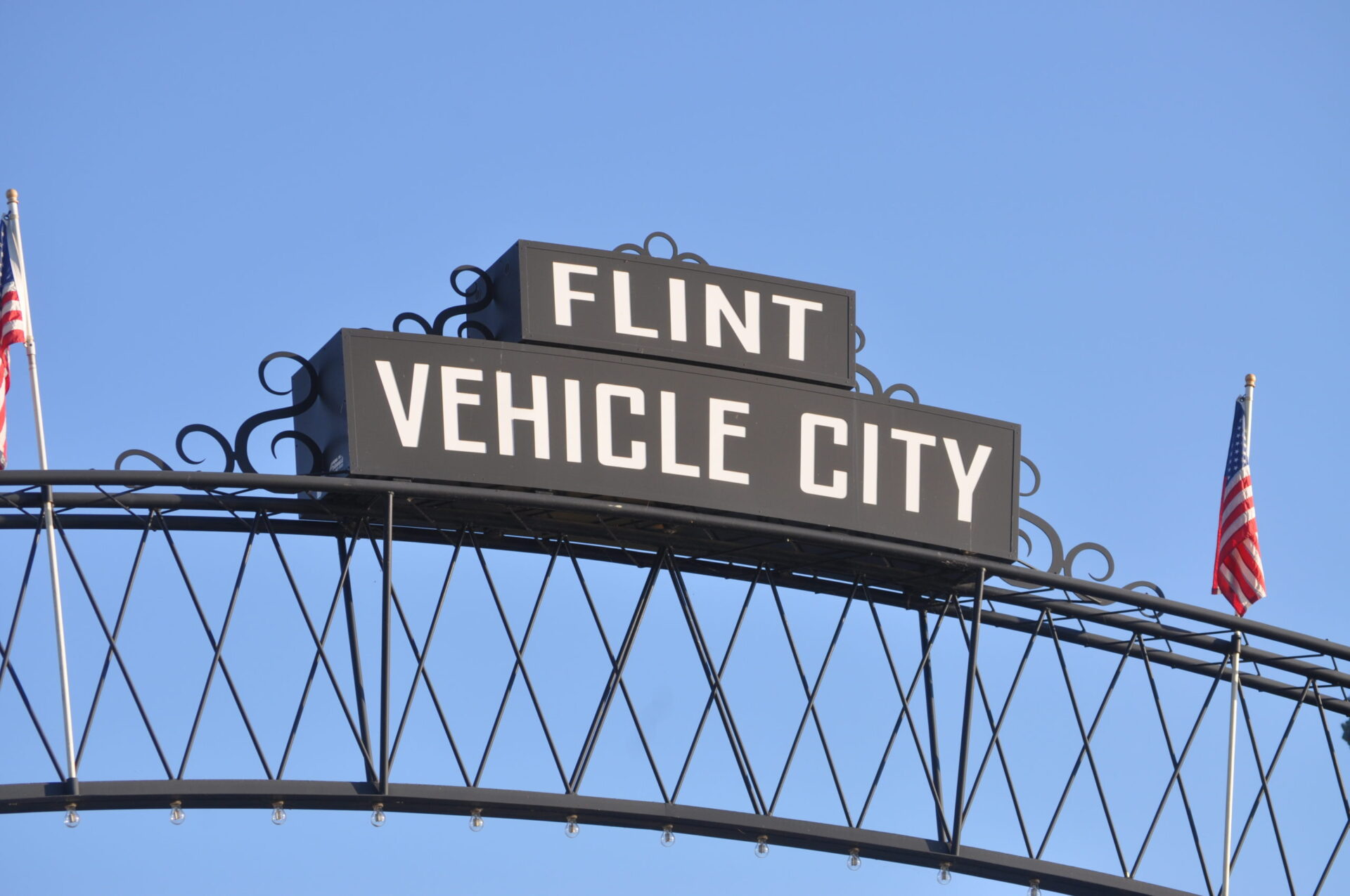By Paul Rozycki
It was just over a year ago that Flint’s Mayor Karen Weaver, gave the last state of the city address in a packed house at Flint’s Capitol Theater, shortly before the election. This year, with the COVID-19 pandemic, Flint’s Mayor Sheldon Neeley, drew a contrast with the previous administration, and faced a dramatically different challenge. He gave his first State of the City address virtually, on both NBC 25, You Tube, and social media. The Flint City Council held a special meeting at the same time for the speech.

Image provided by the City of Flint website.
As Mayor Neeley reviewed his administration’s accomplishments for the last year, he laid out a three-tiered theme. He said his three point plan was based on “prayer, planning and partnership,” and touched on all of those.
Among the accomplishments he cited were a 99 percent response rate on the city’s census effort, steps underway to hire more police officers, formation of a racial justice task force, removal of two million pounds of trash in the city’s blight flight, completion of a financial audit, and central to everything, numerous steps taken to combat COVID-19.
He began by thanking many of the pastors who supported and worked with him, and also thanked his family, and friends saying, “it takes a village to raise a child.”
Saying that the city of Flint was strong “if we stand together” he reviewed the key accomplishments of the past year.
The census: 99 percent response rate
Making sure everyone in the city was counted for the U.S. Census was a major undertaking, Neeley said, and with a 99 percent response rate, the city reached an all-time high for turnout, under the direction of Tony Turner. Neeley said the early formation of coordinating committees was key to the great response rate.
City finances present challenges
Neeley declared the financial audit of the city eliminated what he called a “fantasy fund balance” in the city’s accounts. He admitted there were serious financial challenges in the future, and that “next year’s budget won’t be easy.” He said the budget presented to the city council in July was realistic and followed the new city charter.
COVID-19 pandemic
The COVID-19 pandemic gave the city new challenges, as it has for the nation and the world. Neeley took time for a moment of silence to honor those who have died as a result of the virus, including several who were part of his administration.

COVID-19 testing in the City of Flint during the summer of 2020. Photo by Tom Travis)
He then highlighted some of the steps the city has taken in response to the pandemic, including closing of City Hall twice, setting up a customer service window outside, and establishing a more thorough cleaning of the building.
He said Flint was the only city that created a water payment assistance fund to aid those with financial problems, as a result of the pandemic, and brought a medical advisor on board to deal with the crisis—the only city to do so.
While noting that there was a ‘blue ribbon’ COVID task force to plan the reopening of the city, Neeley said the pandemic “is still a threat,” and reminded viewers to “get tested, practice social distancing, and wear a mask.” He mentioned three testing centers available for the public.
Two million pounds of trash removed in blight fight
Neeley turned to the fight against blight as his fourth topic, and said that in trying to improve neighborhoods, the city has removed more than two million pounds of trash that had been dumped in Flint, and asked viewers to report those who are dumping trash in the city. He said “Blight is everybody’s fight.”
Racial injustice: task force formed, racism a “public health issue”
He then addressed the issue of racial injustice and the Black Lives Matter movement, that has been a major protest movement, both in Flint and nationwide. Speaking of the protests, Neeley said “I am with you…and when there is a call for action, I am listening.”

Protester raises a Black Lives Matter sign at a recent protest on Miller Road in Flint Township. (Photo by Tom Travis)
He said that “racism is a public health issue,” and his administration has created a task force to “bring people together” and that “together we are all stronger.” He said that he took pride in being the first community in Michigan to make ‘Juneteenth’ a legal holiday in the city of Flint.
He also thanked the Flint Police Department, Chief Terrence Greene and former Police Chief Phil Hart for their willingness to work with him on the issue.
City hiring more police, gun auctions cancelled
He said “we need more cops on the street” in Flint and was moving to hire additional officers. A recent recruiting campaign generated more than 200 applicants for 14 new positions. Neeley said that “we now have more officers” that the city had in the previous administration, and that a police contract had been settled providing for improved wages and medical benefits for officers.

Mayor Neeley at a press conference in the summer of 2020 announcing the canceling of gun auctions. (Photo by Tom Travis)
In terms of public safety, Neeley said that his administration has cancelled all gun auctions in an attempt to keep guns off the street. He said that while the auctions did generate some revenue, they were “short sighted and wrong” and that “we will no longer be arms dealers.”
Neeley also praised the efforts of neighborhood groups, and encouraged more people to get involved, saying “We need to have a dialogue” in order to truly understand the public.
Flint water crisis: no shutoffs, pipe replacement progressing
The mayor addressed the water crisis by saying “water is a human right” and that no water has been shut off for lack of payment. He said major progress is being made on replacing Flint’s pipes and water infrastructure, and that studies were underway to make water more affordable in Flint.
Streets and roads: partnerships sought
In addition to the water issue, Neeley said his administration was making efforts to improve the roads and streets in the city. While funding is a challenge, they hoped to find creative partnerships to support the process. He said they would be using a ‘triage’ method where those streets with the greatest need would be repaired first.

Street renovations on W. Court Street in the College Cultural Neighborhood in Flint. (Photo by Tom Travis)
Economic development was also seen as key to the revival of Flint and Neeley highlighted several groups working to bring more business into the city.
Looking ahead
As he concluded, Neeley returned to his initial three principles—prayer, planning and partnership — calling on everyone to work with him. As he thanked the city council, the administration, and the public he said , “If we unite in our efforts and work together…in the spirit of unity and positivity, the state of the city is strong” and we can accomplish much.”
In the background, recall attempt turned down
The lead-up to the speech wasn’t without controversy. In the weeks before the speech, mayoral critic Arthur Woodson attempted to start a recall petition, claiming that Neeley had failed to give a state of the city address within a year of his inauguration. The petition was turned down by the city election commission. Woodson has said he may attempt another recall petition in the future.
EVM political commentator and politics writer Paul Rozycki can be reached at paul.rozycki@mcc.edu.








You must be logged in to post a comment.